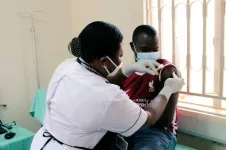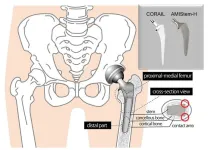(Press-News.org) DURHAM, N.C. -- Medications used by astronauts on the International Space Station might not be good enough for a three-year journey to Mars.
A new study led by Duke Health shows that over half of the medicines stocked in space -- staples such as pain relievers, antibiotics, allergy medicines, and sleep aids -- would expire before astronauts could return to Earth.
Astronauts could end up relying on ineffective or even harmful drugs, according to the study appearing July 23 in npj Microgravity, a Nature journal.
“It doesn’t necessarily mean the medicines won't work, but in the same way you shouldn’t take expired medications you have lying around at home, space exploration agencies will need to plan on expired medications being less effective,” said senior study author Daniel Buckland, M.D., Ph.D., an assistant professor of emergency medicine at Duke University School of Medicine and an aerospace medicine researcher.
Expired medications can lose their strength by a little – or a lot. The actual stability and potency of medications in space compared to Earth remain largely unknown. The harsh space environment, including radiation, could reduce the effectiveness of medications.
Buckland and co-author Thomas E. Diaz, a pharmacy resident at The Johns Hopkins Hospital, noted that expired medications could pose a challenge as space agencies plan for long-duration missions to Mars and beyond.
Diaz used a Freedom of Information Act Request to obtain information about the space station formulary, assuming NASA would use similar medications for a Mars mission.
Using a database of international drug expiration dates, the researchers determined that 54 of the 91 medications had a shelf-life of 36 months or less.
Using the most optimistic estimates, about 60% of these medications would expire before a Mars mission concludes. Under more conservative assumptions, the figure jumps to 98%.
The study did not assume accelerated degradation but focused on the inability to resupply a Mars mission with newer medicines. This lack of resupply affects not only medications but also other critical supplies, such as food.
Increasing the number of medications brought on board could also help compensate for lowered efficacy of expired meds, authors said.
“Those responsible for the health of space flight crews will have to find ways to extend the expiration of medications to complete a Mars mission duration of three years, select medications with longer shelf-lives, or accept the elevated risk associated with administering expired medication,” Diaz said.
“Prior experience and research show astronauts do get ill on the International Space Station, but there is real-time communication with the ground and a well-stocked pharmacy that is regularly resupplied, which prevents small injuries or minor illnesses from turning into issues that affect the mission,” Buckland said.
Additional authors include Emma Ives and Diana I. Lazare. The study received no external funding.
END
Expiring medications could pose challenge on long space missions
Medications commonly used by astronauts aboard the International Space Station might be ineffective or harmful on a multi-year mission to Mars
2024-07-23
ELSE PRESS RELEASES FROM THIS DATE:
Study of urban moss raises concerns about lead levels in older Portland neighborhoods
2024-07-23
CORVALLIS, Ore. – Lead levels in moss are as much as 600 times higher in older Portland, Oregon, neighborhoods where lead-sheathed telecommunications cables were once used compared to lead levels in nearby rural areas, a new study of urban moss has found.
The findings raise concerns about lead exposure in pre-1960 neighborhoods where the cables were common and in some cases are still in place even though they are no longer in use, said Alyssa Shiel, an environmental geochemist at Oregon State University, and the study’s ...
Preclinical model offers new insights into Parkinson’s disease process
2024-07-23
A new preclinical model offers a unique platform for studying the Parkinson’s disease process and suggests a relatively easy method for detecting the disease in people, according to a new study led by Weill Cornell Medicine researchers.
In the study, published July 23 in Nature Communications, the researchers showed that knocking out a key component involved in protein transportation in the light-sensing rod cells of mice leads to the retinal accumulation of the aggregates of a protein called alpha-synuclein found in patients with Parkinson’s disease.
“This is a really unique model involving a pathology that seems more like human Parkinson’s than what we see in ...
New rapid method for determining virus infectivity
2024-07-23
A new method that can rapidly determine whether a virus is infectious or non-infectious could revolutionise the response to future pandemics.
Called FAIRY (Fluorescence Assay for vIRal IntegritY), the assay can screen viruses against virucidal antivirals in minutes, allowing for the effectiveness of antiviral measures, such as disinfectants that break the chain of infection, to be quickly determined.
Dr Samuel Jones from Birmingham’s School of Chemistry led the research team that developed the FAIRY assay. ...
HIV vaccines tested in PrEPVacc fail to reduce infections
2024-07-23
The results of the PrEPVacc HIV vaccine trial conducted in Eastern and Southern Africa, which ran between 2020 and 2024, show conclusively that neither of the two experimental vaccine regimens tested reduced HIV infections among the study population.
Vaccinations in the PrEPVacc trial were stopped in November 2023 (and publicly announced in December 2023) when it became clear to independent experts monitoring the study data that there was little or no chance of the vaccines demonstrating efficacy in preventing HIV acquisition.
The PrEPVacc ...
Study by TU Graz shows that abrasion emissions from trains are not negligible
2024-07-23
In addition to exhaust emissions, abrasion emissions from tyres and brakes have become increasingly important when assessing the environmental impact of traffic. However, the focus here was on road vehicles; rail was hardly considered. In a study commissioned by the German Centre for Rail Transport Research (DZSF), researchers from the Institute of Thermodynamics and Sustainable Propulsion Systems at Graz University of Technology (TU Graz) have now been able to prove that so-called non-exhaust emissions from rail transport also have a relevant influence on air quality and soil pollution.
Half of the daily particulate matter limit due to trains ...
Heat-sensitive trees move uphill seeking climate change respite
2024-07-23
Trees in the Brazilian Atlantic Forest are migrating in search of more favourable temperatures with species in mountain forests moving uphill to escape rising heat caused by climate change, a new study reveals.
Most species in higher parts of the Brazilian Atlantic Forest are moving upwards as temperatures rise, but scientists say that those trees which thrive in colder temperatures are at risk of dying out as the world continues to warm.
Researchers studying the forest, which stretches along the Brazil’s Atlantic seaboard, have also discovered that some trees in ...
Arm robots are not the answer for stroke rehabilitation
2024-07-23
Commercial arm robots are increasingly deployed in order to aid stroke patients in their recovery. Around 80% of patients have problems with their arm function. Robots are also seen as a solution for financial, and staffing, shortcomings in the healthcare sector. However, research led by Amsterdam UMC now shows that they offer no clinically meaningful effects for patients. The research is published today in Neurology.
"In particular countries such as China, Japan and South Korea, but also in North America and Europe, are UL-Robots seen more ...
Staying hip to orthopedic advances: Comparing traditional and new hip replacement stems
2024-07-23
Osaka, Japan — Needing a hip replacement is unfortunate, but even more unfortunate is to need to do it again.
Surgeons at Osaka Metropolitan University have provided new insights into the performance of two types of stems used in total hip replacement surgery. Their findings are expected to contribute to the enhancement of long-term outcomes, improving patients’ quality of life and reducing the need for revision surgeries.
Their paper was published in The Bone & Joint Journal on June 1.
The hip joint, which connects the femur, or thighbone, to the pelvis, plays a crucial ...
Brain care score for dementia and stroke also predicts late-life depression
2024-07-23
Late-life depression, typically defined as depression with onset in individuals over 60 years of age, can affect up to a third or more of people older than 60 and can be debilitating. But, like other neurological conditions, an individual’s risk may be influenced by lifestyle choices. Researchers from Mass General Brigham previously developed and validated the Brain Care Score (BCS) for helping patients and clinicians identify lifestyle changes that may reduce their risk of dementia and stroke. Now, with collaborators at Yale University, they have shown that a higher BCS is also associated with a ...
A window of opportunity for climate change and biodiversity
2024-07-23
World leaders must take advantage of a pivotal window of opportunity for forging a much-needed joined-up approach to tackle climate change and biodiversity loss, say scientists from ZSL and York University. Without this, work on tackling either crisis could inadvertently harm progress on the other.
Published today (Tuesday 23 July) in the Journal of Applied Ecology, a paper from international conservation charity ZSL and researchers at York University, Toronto, titled ‘The Kunming-Montreal Global Biodiversity Framework and the Paris Agreement need a joint work programme for climate, nature, and people’ conceptualises how a joint work ...
LAST 30 PRESS RELEASES:
Machine learning tool can predict serious transplant complications months earlier
Prevalence of over-the-counter and prescription medication use in the US
US child mental health care need, unmet needs, and difficulty accessing services
Incidental rotator cuff abnormalities on magnetic resonance imaging
Sensing local fibers in pancreatic tumors, cancer cells ‘choose’ to either grow or tolerate treatment
Barriers to mental health care leave many children behind, new data cautions
Cancer and inflammation: immunologic interplay, translational advances, and clinical strategies
Bioactive polyphenolic compounds and in vitro anti-degenerative property-based pharmacological propensities of some promising germplasms of Amaranthus hypochondriacus L.
AI-powered companionship: PolyU interfaculty scholar harnesses music and empathetic speech in robots to combat loneliness
Antarctica sits above Earth’s strongest “gravity hole.” Now we know how it got that way
Haircare products made with botanicals protects strands, adds shine
Enhanced pulmonary nodule detection and classification using artificial intelligence on LIDC-IDRI data
Using NBA, study finds that pay differences among top performers can erode cooperation
Korea University, Stanford University, and IESGA launch Water Sustainability Index to combat ESG greenwashing
Molecular glue discovery: large scale instead of lucky strike
Insulin resistance predictor highlights cancer connection
Explaining next-generation solar cells
Slippery ions create a smoother path to blue energy
Magnetic resonance imaging opens the door to better treatments for underdiagnosed atypical Parkinsonisms
National poll finds gaps in community preparedness for teen cardiac emergencies
One strategy to block both drug-resistant bacteria and influenza: new broad-spectrum infection prevention approach validated
Survey: 3 in 4 skip physical therapy homework, stunting progress
College students who spend hours on social media are more likely to be lonely – national US study
Evidence behind intermittent fasting for weight loss fails to match hype
How AI tools like DeepSeek are transforming emotional and mental health care of Chinese youth
Study finds link between sugary drinks and anxiety in young people
Scientists show how to predict world’s deadly scorpion hotspots
ASU researchers to lead AAAS panel on water insecurity in the United States
ASU professor Anne Stone to present at AAAS Conference in Phoenix on ancient origins of modern disease
Proposals for exploring viruses and skin as the next experimental quantum frontiers share US$30,000 science award
[Press-News.org] Expiring medications could pose challenge on long space missionsMedications commonly used by astronauts aboard the International Space Station might be ineffective or harmful on a multi-year mission to Mars



